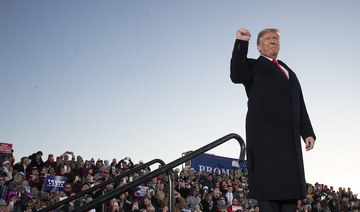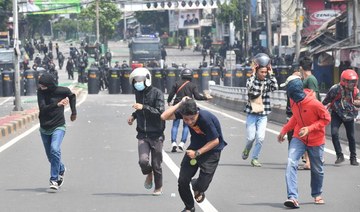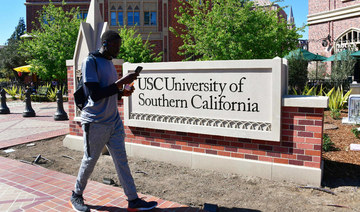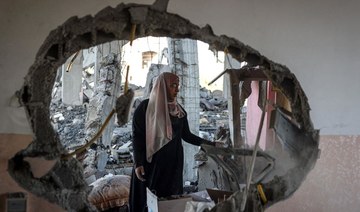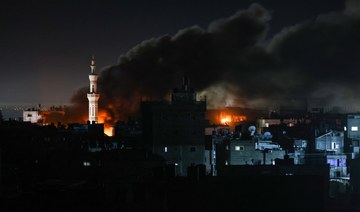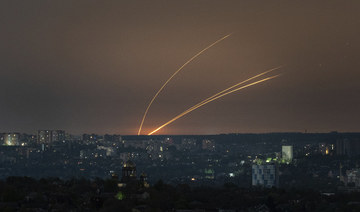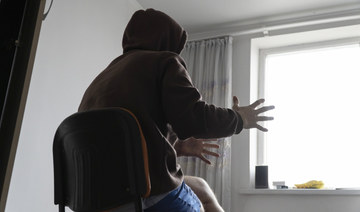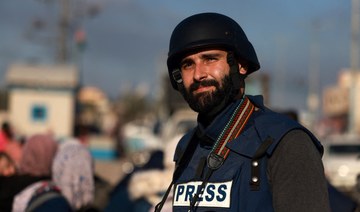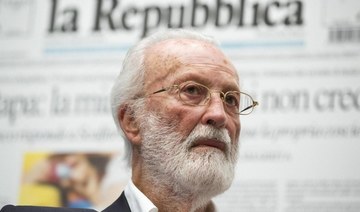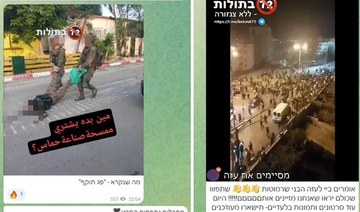LONDON: Katie Jones sure seemed plugged into the Washington’s political scene. The 30-something redhead boasted a job at a top think tank and a who’s-who network of pundits and experts, from the centrist Brookings Institution to the right-wing Heritage Foundation. She was connected to a deputy assistant secretary of state, a senior aide to a senator and the economist Paul Winfree, who is being considered for a seat on the Federal Reserve.
But Katie Jones doesn’t exist, The Associated Press has determined. Instead, the persona was part of a vast army of phantom profiles lurking on the professional networking site LinkedIn.
Experts who reviewed the Jones profile’s LinkedIn activity say it’s typical of espionage efforts on the professional networking site, whose role as a global Rolodex has made it a powerful magnet for spies.
“It smells a lot like some sort of state-run operation,” said Jonas Parello-Plesner, who serves as program director at the Denmark-based think tank Alliance of Democracies Foundation and was the target several years ago of an espionage operation that began over LinkedIn .
William Evanina, director of the US National Counterintelligence and Security Center, said foreign spies routinely use fake social media profiles to home in on American targets — and accused China in particular of waging “mass scale” spying on LinkedIn.
“Instead of dispatching spies to some parking garage in the USto recruit a target, it’s more efficient to sit behind a computer in Shanghai and send out friend requests to 30,000 targets,” he said in a written statement.
Last month, retired CIA officer Kevin Mallory was sentenced to 20 years in prison for passing details of top secret operations to Beijing, a relationship that began when a Chinese agent posing as a recruiter contacted him on LinkedIn.
Unlike Facebook’s friends-and-family focus, LinkedIn is oriented toward job seekers and headhunters, people who routinely fire out resumes, build vast webs of contacts and pitch projects to strangers. That connect-them-all approach helps fill the millions of job openings advertised on the site, but it also provides a rich hunting ground for spies. And that has Western intelligence agencies worried.
British , French and German officials have all issued warnings over the past few years detailing how thousands of people had been contacted by foreign spies over LinkedIn.
In a statement, LinkedIn said it routinely took action against fake accounts, yanking thousands of them in the first three months of 2019. It also said “we recommend you connect with people you know and trust, not just anyone.”
The Katie Jones profile was modest in scale, with 52 connections. But those connections had enough influence that they imbued the profile with credibility to some who accepted Jones’ invites. The AP spoke to about 40 other people who connected with Jones between early March and early April of this year, many of whom said they routinely accept invitations from people they don’t recognize.
“I’m probably the worst LinkedIn user in the history of LinkedIn,” said Winfree, the former deputy director of President Donald Trump’s domestic policy council, who confirmed connection with Jones on March 28.
Winfree, whose name came up last month in relation to one of the vacancies on the Federal Reserve Board of Governors, said he rarely logs on to LinkedIn and tends to just approve all the piled-up invites when he does.
“I literally accept every friend request that I get,” he said.
Lionel Fatton, who teaches East Asian affairs at Webster University in Geneva, said the fact that he didn’t know Jones did prompt a brief pause when he connected with her back in March.
“I remember hesitating,” he said. “And then I thought, ‘What’s the harm?’“
Parello-Plesner noted that the potential harm can be subtle: Connecting to a profile like Jones’ invites whoever is behind it to strike up a one-on-one conversation, and other users on the site can view the connection as a kind of endorsement.
“You lower your guard and you get others to lower their guard,” he said.
The Jones profile was first flagged by Keir Giles, a Russia specialist with London’s Chatham House think tank. Giles was recently caught up in an entirely separate espionage operation targeting critics of the Russian antivirus firm Kasperky Lab. So when he received an invitation from Katie Jones on LinkedIn he was suspicious.
She claimed to have been working for years as a “Russia and Eurasia fellow” at the Center for Strategic and International Studies in Washington, but Giles said that, if that were true, “I ought to have heard of her.”
CSIS spokesman Andrew Schwartz told the AP that “no one named Katie Jones works for us.”
Jones also claimed to have earned degrees in Russian studies from the University of Michigan, but the school said it was “unable to find anyone by this name earning these degrees from the university.”
The Jones account vanished from LinkedIn shortly after the AP contacted the network seeking comment. Messages sent to Jones herself, via LinkedIn and an associated AOL email account, went unreturned.
Several experts contacted by the AP said Jones’ profile picture appeared to have been created by a computer program.
“I’m convinced that it’s a fake face,” said Mario Klingemann, a German artist who has been experimenting for years with artificially generated portraits and says he has reviewed tens of thousands of such images. “It has all the hallmarks.”
Klingemann and other experts said the photo — a closely cropped portrait of a woman with blue-green eyes, copper-colored hair and an enigmatic smile — appeared to have been created using a family of dueling computer programs called generative adversarial networks, or GANs, that can create realistic-looking faces of entirely imaginary people. GANs, sometimes described as a form of artificial intelligence, have been the cause of increasing concern for policymakers already struggling to get a handle on digital disinformation. On Thursday, US lawmakers are due to hold their first hearing devoted primarily to the threat of artificially generated imagery .
Hao Li, who directs the Vision of Graphics Lab at the University of Southern California’s Institute for Creative Technologies, reeled off a list of digital tells that he believes show the Jones photo was created by a computer program, including inconsistencies around Jones’ eyes, the ethereal glow around her hair and smudge marks on her left cheek.
“This is a typical GAN,” he said. “I’ll bet money on it.”
__
Online:
Test your ability to tell a real face from a fake one at: http://www.whichfaceisreal.com/
Generate your own deepfake faces at: https://thispersondoesnotexist.com
Spy used AI-generated face to connect with targets, says expert
Spy used AI-generated face to connect with targets, says expert
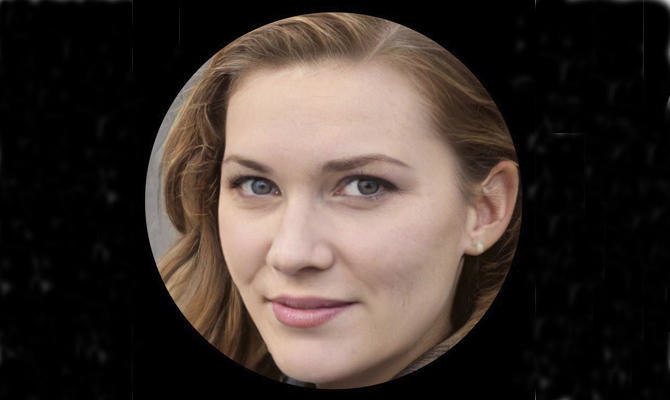
- US counterintelligence official says foreign spies routinely use fake social media profiles to home in on American targets
- Accused China in particular of waging “mass scale” spying on LinkedIn
US police arrest Jadaliyya co-editor Sinan Antoon during pro-Gaza demonstration at New York University

- Antoon was arrested along with other NYU faculty members while attempting to protect demonstrating students from the police
- NYU students were calling for a ceasefire in Palestine's Gaza Strip
LONDON: US police officers on Monday arrested Sinan Antoon, the co-editor of Jadaliyya magazine, during a pro-Gaza demonstration at New York University in Manhattan.
The Arab Studies Institute publication announced in a post on X that Antoon, an associate professor at NYU, was arrested with other faculty members while trying to protect protesting students, who were reportedly calling for a ceasefire in the Gaza Strip.
BREAKING: NYPD arrested Jadaliyya Co-Editor and NYU Associate Professor Sinan Antoon along with other faculty and students as he/they was/were trying to protect NYU students from the Police. We will not ever be silenced.
— Jadaliyya (@jadaliyya) April 23, 2024
Antoon is an Iraqi-American poet, novelist, literary translator and academic. He was born and raised in Baghdad before moving to the US after the 1991 Gulf War.
The Israeli onslaught on the besieged enclave has since Oct. 7 killed at least 34,000 Palestinians, displaced some 1.9 million, and injured more than 75,800 people, according to Gaza’s health authority.
Confirming Jadaliyya’s announcement, human rights attorney Noura Erakat wrote on X: “NYPD is arresting faculty on their campuses for protecting their students.
“The academy is imbricated with the state and the military industry intent on war in blatant abrogation of its mission and any semblance of independence. What a gross betrayal.”
NYPD is arresting faculty on their campuses for protecting their students.
— Noura Erakat (@4noura) April 23, 2024
The academy is imbricated w the state & the military industry intent on war in blatant abrogation of its mission & any semblance of independence. What a gross betrayal. #Gaza #Genocide #Nakba https://t.co/f0tnYhHnNt
On Monday, officers from the New York Police Department moved in on NYU demonstrators after a deadline expired for people to clear an area of the campus, the Financial Times reported.
This came hours after New York’s Columbia University, where more than 100 people were arrested last week, announced it would switch to online classes in an attempt to defuse pro-Palestine protests.
The arrests at the NYU campus are part of a string of US police clampdowns on university students across the country protesting against the war on Gaza.
Local authorities claimed the clampdowns came amid scrutiny over “antisemitism” on US university campuses.
US police also arrested at least 47 pro-Gaza demonstrators at Yale University in New Haven, Connecticut.
The Columbia University clampdown, the first of its kind in three decades, triggered protests on other US campuses, including at Brown University, Berkeley, Princeton, Northwestern, Massachusetts Institute of Technology, and Emerson College in Boston.
In addition to calling for a ceasefire in Gaza, the protesting students also reportedly called for divestment of the university’s funds from companies linked to Israel.
PEN America awards canceled after writers’ boycott over Gaza
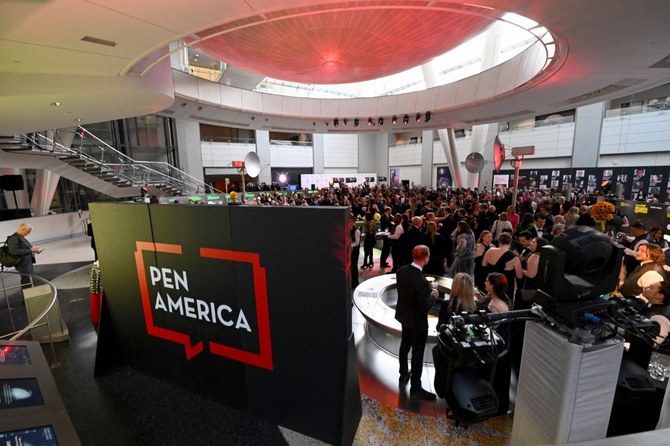
- Almost half of nominated authors withdrew works from consideration
- PEN America accused of complicity in ‘normalizing genocide’ in Gaza
LONDON: PEN America has cancelled its 2024 annual literary awards after several authors boycotted the event over the organization’s perceived failure to take a strong stance against Israel’s war on Gaza.
The decision came in response to an open letter signed by dozens of authors and translators who withdrew their work from consideration for the awards.
Sixty-one authors and translators were nominated but 28 withdrew their work, according to a statement released on Monday, forcing the organization to cancel next week’s event.
“This is a beloved event and an enormous amount of work goes into it, so we all regret this outcome but ultimately concluded it was not possible to carry out a celebration in the way we had hoped and planned,” said CEO Suzanne Nossel.
The boycott emerged amidst growing tensions with PEN, with authors urging the organization to take a stronger stance on the Palestinian crisis and advocate for a Gaza ceasefire.
In the letter, PEN was accused of acting as a “cultural front for American exceptionalism” and complicity in “normalizing genocide” by failing to address the situation in Gaza adequately.
“In the context of Israel’s ongoing war on Gaza, we believe that PEN America has betrayed the organization’s professed commitment to peace and equality for all, and to freedom and security for writers everywhere,” said a separate letter signed last month by several famous writers including Michelle Alexander, Naomi Klein and Zaina Arafat.
PEN America has defended its actions, citing its recent condemnation of the loss of life in Gaza, calls for a ceasefire, and the establishment of a $100,000 emergency fund for Palestinian writers.
The awards, which celebrates voices across various genres including writers of fiction, poetry, children’s literature and drama, was scheduled for April 29 at the Town Hall in New York City.
Russia orders jail term for Meta spokesman in absentia on ‘terrorism’ charges
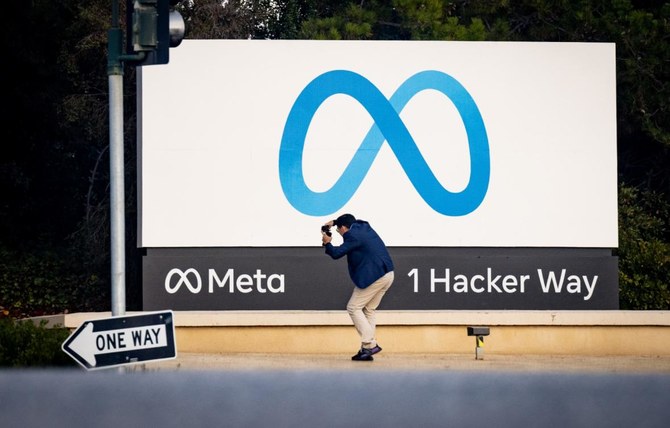
- Andy Stone was sentenced to six years in what has been described as a symbolic ruling agaist Western social media platforms
MOSCOW: A Russian military court on Monday sentenced in absentia Meta spokesman Andy Stone to six years behind bars for “justifying terrorism,” as part of efforts to restrict Western social media platforms in the country.
The largely symbolic ruling came several months after Mosocw, which has blocked Meta platforms Instagram and Facebook, put the US citizen on a wanted list.
Judge Roman Kiforenko said the sentence would begin upon Stone setting foot on Russian territory or being extradited to Russia, news agencies reported.
The case followed a post by Stone in March 2022 — weeks into Moscow’s offensive in Ukraine — in which he said Facebook would not punish users calling for violence against Russian forces.
Stone said Meta had “temporarily made allowances for forms of political expression that would normally violate our rules like violent speech such as ‘death to the Russian invaders.’“
“We still won’t allow credible calls for violence against Russian civilians,” the post read.
Nick Clegg, the President of Meta Global Affairs, said at the time that the policy would only apply “in Ukraine itself.”
Clegg said the decision was taken in “extraordinary and unprecedented circumstances” and was designed to protect “people’s rights to speech as an expression of self-defense.”
Russia barred Meta CEO Mark Zuckerberg from entering the country shortly after launching hostilities in Ukraine.
Moscow does not tolerate criticism of the offensive on social media, imposing fines or jail terms to thousands for denouncing the large-scale military campaign now in its third year.
Terry Anderson, US journalist held hostage nearly 7 years in Lebanon, dead at 76

- Former AP correspondent was abuducted by pro-Iran Shiite Muslim group as part of “continuing operations against Americans”
LONDON: Terry Anderson, a US journalist who was held captive by Islamist militants for almost seven years in Lebanon and came to symbolize the plight of Western hostages during the country’s 1975-1990 civil war, died on Sunday at age 76, his daughter said in a statement.
The former chief Middle East correspondent for The Associated Press, who was the longest held hostage of the scores of Westerners abducted in Lebanon, died at his home in Greenwood Lake, New York, said his daughter Sulome Anderson, who was born three months after he was seized. No cause of death was given.
Kept in barely-lit cells by mostly Shiite Muslim groups in what was known as The Hostage Crisis, and chained by his hands and feet and blindfolded much of the time, the former Marine later recalled that he “almost went insane” and that only his Roman Catholic faith prevented him from taking his life before he was freed in December 1991.
“Though my father’s life was marked by extreme suffering during his time as a hostage in captivity, he found a quiet, comfortable peace in recent years. I know he would choose to be remembered not by his very worst experience, but through his humanitarian work with the Vietnam Children’s Fund, the Committee to Protect Journalists, homeless veterans and many other incredible causes,” Sulome Anderson said.
The family will take some time to organize a memorial, she said.
Anderson’s ordeal began in Beirut on the morning of March 16, 1985, after he played a round of tennis. A green Mercedes sedan with curtains over the rear window pulled up, three gunmen jumped out and dragged Anderson, still dressed in shorts, into the car.
The pro-Iran Islamic Jihad group claimed responsibility for the kidnapping, saying it was part of “continuing operations against Americans.” The abductors demanded freedom for Shiite Muslims jailed in Kuwait for bomb attacks against the US and French embassies there.
It was the start of a nightmare for Anderson that would last six years and nine months during which he was stuck in cells under the rubble-strewn streets of Beirut and elsewhere, often badly fed and sleeping on a thin, dirty mattress on a concrete floor.
During captivity, both his father and brother would die of cancer and he would not see his daughter Sulome until she was six years old.
“What kept me going?” he asked aloud shortly after release. “My companions. I was lucky to have people with me most of the time. My faith, stubbornness. You do what you have to. You wake up every day, summon up the energy from somewhere. You think you haven’t got it and you get through the day and you do it. Day after day after day.”
Other hostages described Anderson as tough and active in captivity, learning French and Arabic and exercising regularly.
However, they also told of him banging his head against a wall until he bled in frustration at beatings, isolation, false hopes and the feeling of being neglected by the outside world.
“There is a limit of how long we can last and some of us are approaching the limit very badly,” Anderson said in a videotape released by his captors in December 1987.
Marcel Fontaine, a French diplomat who was released in May 1988 after three years of captivity, recalled the time cell mate Anderson thought freedom was near because he was allowed to see the sun and eat a hamburger.
In April 1987 Anderson was given a suit of clothes that his captors had made for him. “He wore it every day,” Fontaine said.
A week later, however, Anderson’s captors took the suit back, leaving him in despair and certain he was forgotten, Fontaine said.
Scores of journalist groups, governments and individuals over the years called for Anderson’s release and his Oct. 27 birthday became an unofficial US memorial day for hostages.
Anderson said he considered killing himself several times but rejected it. He relied heavily on his faith, which he said he had renewed six months before being kidnapped.
“I must have read the Bible 50 times from start to finish,” he said. “It was an enormous help to me.”
His sister, Peggy Say, who died in 2015, was his fiercest advocate during captivity.
She worked tirelessly for her brother’s freedom. She visited Arab and European capitals, lobbied the Pope, the Archbishop of Canterbury and every US official and politician available.
Under pressure from the media and the US hostages’ families, the Reagan administration negotiated a secret and illegal deal in the mid-1980s to facilitate arms sales to Iran in return for the release of American hostages. But the deal, known as the Iran–Contra affair, failed to gain freedom for any of the hostages.
Born Oct. 27, 1947, in Lorain, Ohio, Anderson grew up in Batavia, New York. He graduated from Iowa State University and spent six years in the Marine Corps, mostly as a journalist.
He worked for the AP in Detroit, Louisville, New York, Tokyo, Johannesburg and then Beirut, where he first went to cover the Israeli invasion in 1982.
In that war-torn city, he fell in love with Lebanese woman Madeleine Bassil, who was his fiance and pregnant with their daughter Sulome when he was snatched.
He is survived by his daughters Sulome and Gabrielle, his sister Judy and brother Jack, and by Bassil, whom Sulome Anderson called “his ex-wife and best friend.”
Anderson and fellow hostages developed a system of communication by tapping on walls between their cells. Always the journalist, Anderson passed on news of the outside world he had picked up during captivity to Church of England envoy Terry Waite, being held hostage in an adjacent room in September 1990 after years of solitary confinement.
“Then the world news: the Berlin Wall’s falling, communism’s demise in eastern Europe, free elections in the Soviet Union, work toward multiracial government in South Africa. All the incredible things that have happened since he was taken nearly three years ago. He thought I was crazy,” Anderson wrote in his 1993 book “Den of Lions.”
After his release, Anderson taught journalism at Columbia University in New York, Ohio University, the University of Kentucky and the University of Florida until he retired in 2015.
Among businesses he invested in were a horse ranch in Ohio, and a restaurant. He unsuccessfully ran for the Ohio state Senate as a Democrat in 2004 and sued Iran in federal court for his abduction, winning a multimillion-dollar settlement in 2002.
British man investigated for hate crime after viral racist rant against Muslim women

- ‘I don’t understand why people stand by and let it happen,’ says witness
LONDON: A hate crime investigation is underway following a viral video of an attack against Muslim women in East London, police confirmed on Sunday.
The incident occurred on Saturday in Romford when a white male, wearing glasses, targeted the group, some of whom were wearing hijabs and pushing shopping trolleys.
The footage, shared by Redbridge Community Action Group, shows the man following the women down South Street, a busy shopping area, while shouting and gesturing aggressively as they attempt to leave the scene.
The man is heard using profanities and labeling the women “Muslim traitors.”
In an outburst caught on camera, he accused one of the women of supporting missile attacks against Israel, adding: “We don’t want you here.” He went on to use an expletive.
The Metropolitan Police has confirmed it is treating the confrontation as a hate crime.
Scotland Yard posted on X: “We are aware and urgently investigating this clearly unacceptable incident. We will be speaking to the victim later.”
Vaseem Ahmed, 55, who was participating in a rally supporting a free Palestine, and located near Barclays Bank on the high street, witnessed the incident.
As police arrived, Ahmed noted that the activists dispersed, with the confrontation occurring as the women headed home.
He told The Independent: “I’d say to him (the white male) ‘If you’re going to be brave, do the same thing in front of some Muslim men (and) then see what the outcome is.’
“Don’t target innocent people; it’s the worst kind of bullying. And grow up. Some of the stuff he was saying was really vile.
“He was so angry and so worked up he couldn’t get his words out properly. It wasn’t the most eloquent rant.”
He added: “I know those women from other demonstrations. I was shocked in the way it happened, but then not shocked at the same time. Islamophobic attacks have skyrocketed since Oct. 7.
“A lot of government ministers and even Rishi Sunak refuse to call out Islamophobia when it happens, and people get emboldened.
“We are visibly Muslim, especially women, (and) they become easy targets. That’s the saddest thing.
“I didn’t see anyone intervene. They might have been concerned for their safety, but all you have to do is shout a few times; you don’t have to put yourself in danger. I don’t understand why people stand by and let it happen.”



